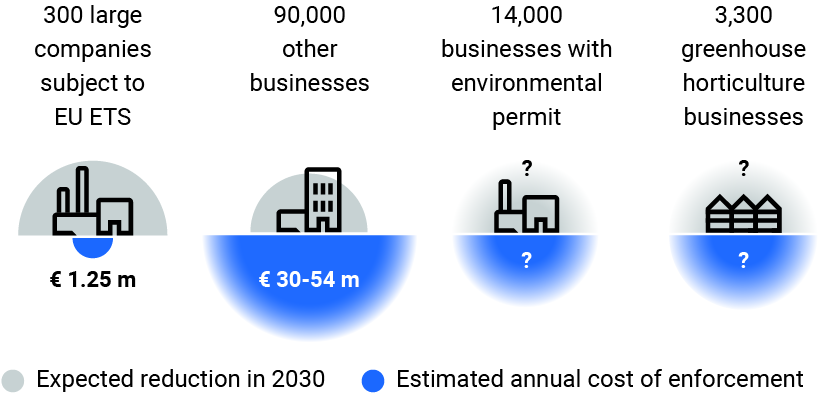After 30 years, not known how much energy businesses can save
Less oversight than minister would like in recent years
Businesses and institutions that are obliged to cut their energy consumption are in all probability saving less energy than the government would like. The obligation has been in force for 30 years and amended several times. The minister also does not know what results oversight of the obligation has produced.
In the Netherlands Court of Audit’s opinion, it is implausible that the government has achieved its energy saving ambitions over the past 15 years. Some 90,000 businesses and institutions (schools, churches, clubs) had been subject to the obligation up to 1 July 2023. The target group was then enlarged with a further 17,500 businesses. The minister has no oversight of compliance with the obligation. Municipalities and provinces are responsible for oversight. It is not known how much they spend on oversight and enforcement. Central government provided more than €18 million in 2023. Together with provinces and municipalities, it should provide sufficient funding for the oversight the minister requires: every business should be checked once every 4 years. This would require 22,500 checks a year. In practice, only a few thousand checks are made; the number rose to 9,400 in 2023.
| In parallel with the Court’s audit, on 21 November the Netherlands Association of Audit Offices published its own report on oversight of the energy saving obligation on behalf of 109 participating provinces and municipalities. Oversight is exercised largely by environmental services. But they have no insight into the businesses and institutions’ energy consumption. They do know how businesses meet their duty to provide information. More than half of the environmental services do not know how much energy a business or institution could save, or even which businesses and institutions are obliged to save energy. In part, this is due to the complexity and ambiguity of the laws and regulations. How often the environmental services carry out checks depends on the budget they receive from municipalities, provinces and central government, and on their staff capacity. Funding has been based to date on temporary agreements, which are detrimental to continuity. The environmental services have been carrying out more checks in recent years, since central government increased its funding. The number of offences detected has also risen. The environmental services need many more years to check all businesses and institutions. 70% of the municipalities have their environmental service oversee the energy saving obligation and the duty to provide information. In the municipalities’ opinion, only 38% of the reports they receive are of good quality. A quarter of the municipalities sometimes use their own inspectors. 10 of the 12 provinces instructed environmental services to check businesses’ compliance with the obligation. 6 provinces said the reports contained acceptable information. One province also performed energy-saving oversight and enforcement tasks itself. The Association of Audit Offices published an overarching report on 21 November 2024. Some regional and local audit offices will carry out additional audits before informing their municipal or provincial councils. |
Inefficient approach to oversight
Energy saving and oversight cost by business category

In its audit report, Energy saving obligation, 2008-2023, published on 21 November 2024, the Court of Audit doubts the efficiency of checking all the businesses concerned. Not every business has the same potential to save energy. Oversight of large companies subject to the EU Emissions Trading System (EU ETS) is expected to be more efficient at lower cost than oversight of the many small businesses obliged to save energy. The Court of Audit recommends that oversight be organised more efficiently.
Minority of businesses comply in full with obligation
Businesses and institutions are subject to the obligation if their annual electricity consumption is at least 50,000 kWh or their gas consumption is at least 25,000 m3. According to the Court of Audit, only a minority of the 90,000 businesses and institutions subject to the energy saving obligation before 2023 complied with it in full. Industry associations said small businesses in particular found the rules complicated and ambiguous. The energy saving obligation was introduced in 1993 and its target group was enlarged last year with companies subject to the EU ETS.
The energy saving obligation is one of the instruments used to meet international climate agreements. If the energy saving ambitions are not achieved, the Netherlands might fail to realise its part of the European targets. Energy savings can also contribute to the CO2 emission reduction target and reduce the Netherlands’ reliance on foreign energy providers. How much energy businesses and institutions are obliged to save is not laid down in regulations.
Response of the minister and the Court of Audit’s afterword
In her response to the Court of Audit’s report, the Minister of Climate Policy and Green Growth recognises that insight into the benefits of the energy saving obligation has been limited in recent years. Furthermore, it is uncertain what results oversight has produced. Since the introduction of a duty on businesses to provide information, however, some improvements have been seen. The minister intends to update the duty in 2027 taking account of the Court’s recommendations. The minister writes that she no longer thinks it appropriate to check every business and institution every 4 years; oversight organisations should decide how often checks are carried out.
The Couret of Audit notes that the minister remains responsible for the results of government policy. It recommends that the policy should be critically reviewed so that policy and implementation lead to the required results. A more efficient approach to oversight could contribute to energy saving results.